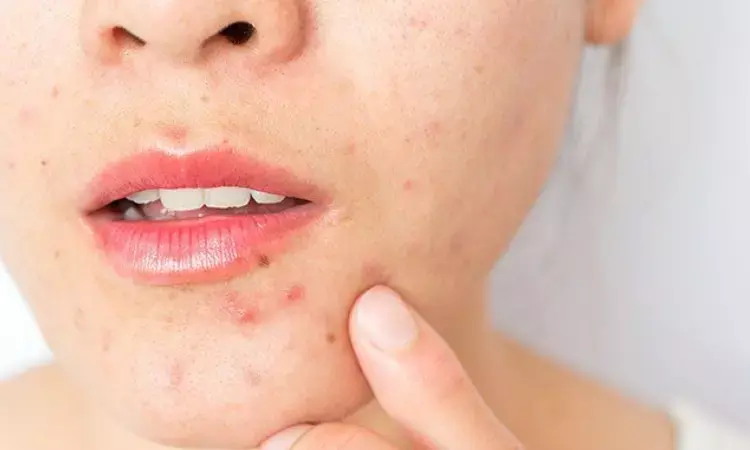- Home
- Medical news & Guidelines
- Anesthesiology
- Cardiology and CTVS
- Critical Care
- Dentistry
- Dermatology
- Diabetes and Endocrinology
- ENT
- Gastroenterology
- Medicine
- Nephrology
- Neurology
- Obstretics-Gynaecology
- Oncology
- Ophthalmology
- Orthopaedics
- Pediatrics-Neonatology
- Psychiatry
- Pulmonology
- Radiology
- Surgery
- Urology
- Laboratory Medicine
- Diet
- Nursing
- Paramedical
- Physiotherapy
- Health news
- Fact Check
- Bone Health Fact Check
- Brain Health Fact Check
- Cancer Related Fact Check
- Child Care Fact Check
- Dental and oral health fact check
- Diabetes and metabolic health fact check
- Diet and Nutrition Fact Check
- Eye and ENT Care Fact Check
- Fitness fact check
- Gut health fact check
- Heart health fact check
- Kidney health fact check
- Medical education fact check
- Men's health fact check
- Respiratory fact check
- Skin and hair care fact check
- Vaccine and Immunization fact check
- Women's health fact check
- AYUSH
- State News
- Andaman and Nicobar Islands
- Andhra Pradesh
- Arunachal Pradesh
- Assam
- Bihar
- Chandigarh
- Chattisgarh
- Dadra and Nagar Haveli
- Daman and Diu
- Delhi
- Goa
- Gujarat
- Haryana
- Himachal Pradesh
- Jammu & Kashmir
- Jharkhand
- Karnataka
- Kerala
- Ladakh
- Lakshadweep
- Madhya Pradesh
- Maharashtra
- Manipur
- Meghalaya
- Mizoram
- Nagaland
- Odisha
- Puducherry
- Punjab
- Rajasthan
- Sikkim
- Tamil Nadu
- Telangana
- Tripura
- Uttar Pradesh
- Uttrakhand
- West Bengal
- Medical Education
- Industry
Topical oxymetazoline hydrochloride reduces post-acne erythema: Study

A new study by Chanudda Washrawirul and team shows that the topical oxymetazoline hydrochloride (OxH) 0.05% solution reduced post-acne erythema (PAE) without a rebound effect and was efficient, well-tolerated, and safe. The findings of this study were published in the Journal of Dermatology.
One of the most frequent aftereffects of acne inflammation is post-acne erythema. Unfortunately, the lack of effective topical therapies means that treating PAE is still difficult. In order to assess the effectiveness and safety of topical oxymetazoline hydrochloride 0.05% solution for PAE, this study was carried out.
This study was a split-face, randomized, placebo-controlled experiment that was conducted in Bangkok, Thailand, between December 2021 and March 2022, with participants and researchers both blinded. Eligible participants were healthy people between the ages of 18 and 45 with mild to severe PAE on both sides of the face, as determined by the Clinician's Erythema Assessment (CEA). Following randomization, each subject used OxH twice daily for 12 weeks on one side of their faces and a placebo on the other. The main result was the number of PAE lesions. Erythema index, clinical response rate at week 12 (defined as "clear," "almost clear," or "at least two-grade improvement" by CEA), and patient satisfaction ratings were the secondary objectives.
The key findings of this study were:
1. There were 30 contestants in all. After 8 weeks of therapy, the OxH-treated skin had a considerably larger mean difference (MD) decrease in PAE lesion counts than the placebo.
2. Similar to this, starting in the second week, the MD decrease of the erythema index was larger in the skin treated with OxH.
3. Furthermore, the OxH-treated group saw a greater clinical response rate after 8 weeks of therapy and reported feeling more satisfied than those who received the placebo.
4. Throughout the course of the research, there were no severe adverse events or erythema flare-ups.
Topical oxymetazoline is an efficient and well-tolerated therapy for post-acne erythema. There is a need for longitudinal research to look at how long an effect lasts.
Reference:
Washrawirul, C., Puaratana‐arunkon, T., Chongpison, Y., Noppakun, N., Asawanonda, P., & Kumtornrut, C. (2023). The role of the topical nasal decongestant oxymetazoline as a novel therapeutic option for post‐acne erythema: A split‐face, double‐blind, randomized, placebo‐controlled trial. In The Journal of Dermatology. Wiley. https://doi.org/10.1111/1346-8138.16749
Neuroscience Masters graduate
Jacinthlyn Sylvia, a Neuroscience Master's graduate from Chennai has worked extensively in deciphering the neurobiology of cognition and motor control in aging. She also has spread-out exposure to Neurosurgery from her Bachelor’s. She is currently involved in active Neuro-Oncology research. She is an upcoming neuroscientist with a fiery passion for writing. Her news cover at Medical Dialogues feature recent discoveries and updates from the healthcare and biomedical research fields. She can be reached at editorial@medicaldialogues.in
Dr Kamal Kant Kohli-MBBS, DTCD- a chest specialist with more than 30 years of practice and a flair for writing clinical articles, Dr Kamal Kant Kohli joined Medical Dialogues as a Chief Editor of Medical News. Besides writing articles, as an editor, he proofreads and verifies all the medical content published on Medical Dialogues including those coming from journals, studies,medical conferences,guidelines etc. Email: drkohli@medicaldialogues.in. Contact no. 011-43720751


